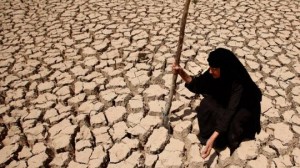Natural Disasters64
-

Parched for Peace: The Fertile Crescent Might Be Barren
This past October, the Levant Desalination Association and Nosstia, an organization of expat Syrian scientists, arranged a conference in the capital city of Damascus to discuss Syria’s water crisis.
-
New York Earthquake Barely Causes a Stir
Though the earthquake that no one really noticed yesterday was the largest to hit the New York area in 18 years, it’s important to note that it wasn’t an unusual event. One person in a WNYC story was quoted as saying that he had fun. Researchers at the Earth Institute have kept close tabs on…
-

Plastic Bottles, Compost Toilets and Rainwater Catchment: Simple Solutions for Haiti’s Clean Water Crisis
There are many other low-cost, high-impact approaches to alleviating the clean water crises in places like Haiti, so it’s worth mentioning a few.
-
COP16 event on Climate Services & Disaster Risk
December 3: COP16 event in Cancún on Climate Services and Disaster Risk Management.
-

Parched for Peace: A Miniseries on the Mideast Water Crisis
For a vast majority of the past fifty years, oil and its abundance defined the Middle East. In coming years, however, that part of the world may well be defined by the dearth of a different natural resource: water.
-

Measuring Earthquakes in Western New York
Each year, dozens of small, mostly harmless earthquakes quakes rattle the northeastern United States and southern Canada, and one quite active area runs along the shores of lakes Erie and Ontario, in western New York. In order to learn more about what generates these, and the possible threat of something bigger, scientists at Columbia University’s Lamont-Doherty Earth…
-

A Year of Progress Toward a Sustainable Earth
The Earth Institute’s annual donor report is now available in an interactive digital format. We remain committed to finding extraordinary solutions to unprecedented world challenges, and this report highlights some of our innovative projects in research, policy and education, and the partnerships that are helping to support them.
-

IRI Scientist Wins NSF CAREER Award
Alessandra Giannini, a research scientist at the IRI, has been awarded a National Science Foundation CAREER award to advance our understanding of uncertainty in climate model projections in the African Sahel and other semi-arid regions of the world.
-

Haiti Regeneration Initiative Team Resumes Research
Post-earth quake, the project team for the Haiti Regeneration Initiative (HRI) resumes fieldwork in the Haitian countryside. Program coordinator Alex Fischer is interviewed.

By studying thousands of buildings and analyzing their electricity use, Columbia Climate School Dean Alexis Abramson has been able to uncover ways to significantly cut energy consumption and emissions. Watch the Video: “Engineering a Cooler Future Through Smarter Buildings“
